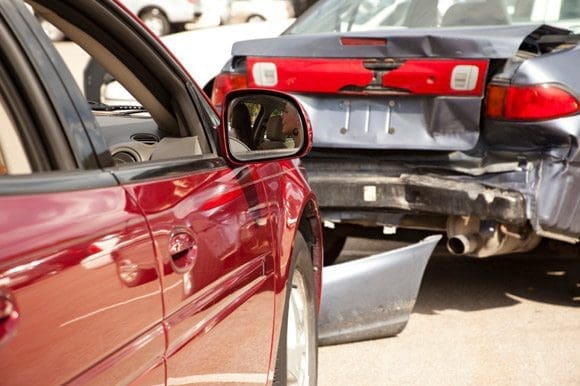An auto accident is one of the leading causes of spine injuries and is responsible for more than 40 percent of injuries every year. That is a troubling statistic. Because auto accidents cannot always be prevented, having the right understanding of spine injuries can allow people to recognize injury and seek proper treatment.
The spine is an intricate structure, but additionally it is delicate. The spine isn’t designed to withstand the harmful effects of an auto accident. Regrettably, spine and neck injuries are common during auto collisions; the impact damages the muscles and the ligaments in the back, and the facet joints bear the brunt of the force. This could result in injuries, such as compression fractures, disk herniation, whiplash, and spondylolisthesis.
It is essential to be able to spot the symptoms of damage or injury, so if you or someone you love is hurt, its important to understand what steps you should follow for proper care. Some auto accidents may be made worse when the injured individual is moved. You should seek the assistance of a medical professional if you experience back or neck pain following an automobile collision. A muscle strain may heal by itself, but if neck or back pain persists due to a much more serious condition or injury, the affected individual could feel pain for months or years if left untreated.
Table of Contents
Identifying Damage or Injury
How do you know if back or neck pain is simply a muscle strain, or even a more significant injury or condition? Until you are evaluated by a healthcare specialist, you likely won’t know for certain, however there are a number of indications that may indicate that aid is needed. A few of the neck and back injuries include:
Whiplash
Whiplash is more common during rear-end collisions, as the force from impact suddenly pushes the head backward, then forward, much like the movement of hammering a whip. Front-end collisions generally do not result in whiplash, as the headrest often stops the motion of the head and neck. Symptoms of whiplash will appear within one day of the crash, and might include stiffness and pain in the neck, headaches which are often at the bottom of the skull, dizziness, blurred vision, and fatigue. Sometimes, an individual with whiplash may experience difficulty concentrating, memory problems, ringing in the ears, difficulty sleeping, and irritability.
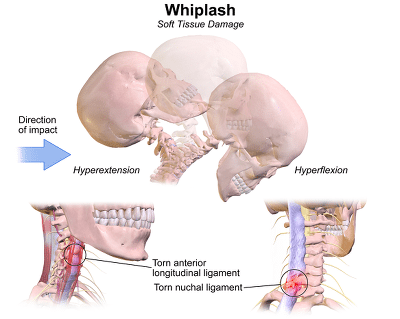
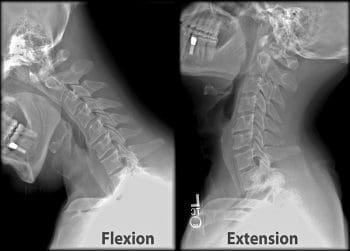
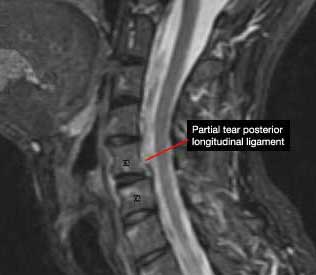
Spinal Fractures
Compression fractures are common in the thoracic and cervical spine (middle and lower back) after a car crash. While the entire body is held in place with a seatbelt, during impact, the body may be thrown forward. This can pull on the vertebrae. As the vertebrae may rarely move, in some cases, spinal fractures may result in spinal cord injuries. Those with spinal cord injuries may experience tingling, numbness, weakness, or loss of bowel and bladder control, although the main symptom of a spinal fracture is mild to severe back pain that interferes with movement. When a fracture is suspected, it is important not to move the injured person; harm could be caused by motion.
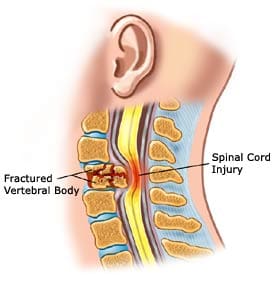
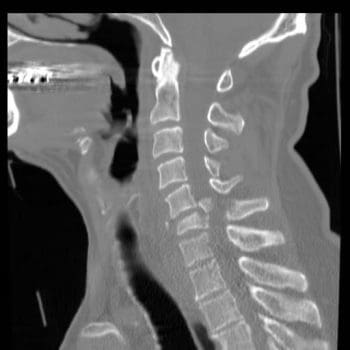
Spondylolisthesis
Spondylolisithesis occurs when a vertebra shifts from place because of a stress fracture in bone. The bone that is displaced can press on the nerves or narrow the spinal canal, causing pain, numbness, or weakness in the buttock or leg, and trouble walking. In extreme cases, it may lead to loss of bladder or bowel control. Some people don’t experience symptoms until many years later, or experience no symptoms in any way.
Disc Herniation
Considering that the discs absorb the vast majority of the impact to the spine, it is possible to get a disc to herniate through an auto accident. A disc is herniated if its tender core pushes through a little crack in the outside of the disc, irritating the nerves. Many people today experience no symptoms, but others might experience leg or arm pain, depending on the location of the herniated disc, and might experience tingling, numbness, or weakness in the region.
What to Do if You’ve Got a Spinal Injury
Should you encounter any back or neck pain at all following a auto accident, you should be evaluated by a healthcare professional to rule out any severe injury. But, it is important to get medical care immediately in case you experience tingling, numbness, fatigue, or lack of bowel or bladder control. These are indications of a more serious injury that has to be addressed immediately.
The scope of our information is limited to chiropractic and spinal injuries and conditions. To discuss options on the subject matter, please feel free to ask Dr. Jimenez or contact us at 915-850-0900 . 
By Dr. Alex Jimenez
Additional Topics: Auto Accident Injuries
Whiplash, among other auto accident injuries, are frequently reported by victims of an auto collision, regardless of the severity and grade of the accident. The sheer force of an impact can cause damage or injury to the cervical spine, as well as to the rest of the spine. Whiplash is generally the result of an abrupt, back-and-forth jolt of the head and neck in any direction. Fortunately, a variety of treatments are available to treat auto accident injuries.
.video-container { position: relative; padding-bottom: 63%; padding-top: 35px; height: 0; overflow: hidden;}.video-container iframe{position: absolute; top:0; left: 0; width: 100%; height: 90%; border=none; max-width:100%!important;}
Post Disclaimer
Professional Scope of Practice *
The information on this blog site is not intended to replace a one-on-one relationship with a qualified healthcare professional or licensed physician and is not medical advice. We encourage you to make healthcare decisions based on your research and partnership with a qualified healthcare professional.
Blog Information & Scope Discussions
Welcome to El Paso's Premier Wellness and Injury Care Clinic & Wellness Blog, where Dr. Alex Jimenez, DC, FNP-C, a board-certified Family Practice Nurse Practitioner (FNP-BC) and Chiropractor (DC), presents insights on how our team is dedicated to holistic healing and personalized care. Our practice aligns with evidence-based treatment protocols inspired by integrative medicine principles, similar to those found on this site and our family practice-based chiromed.com site, focusing on restoring health naturally for patients of all ages.
Our areas of chiropractic practice include Wellness & Nutrition, Chronic Pain, Personal Injury, Auto Accident Care, Work Injuries, Back Injury, Low Back Pain, Neck Pain, Migraine Headaches, Sports Injuries, Severe Sciatica, Scoliosis, Complex Herniated Discs, Fibromyalgia, Chronic Pain, Complex Injuries, Stress Management, Functional Medicine Treatments, and in-scope care protocols.
Our information scope is limited to chiropractic, musculoskeletal, physical medicine, wellness, contributing etiological viscerosomatic disturbances within clinical presentations, associated somato-visceral reflex clinical dynamics, subluxation complexes, sensitive health issues, and functional medicine articles, topics, and discussions.
We provide and present clinical collaboration with specialists from various disciplines. Each specialist is governed by their professional scope of practice and their jurisdiction of licensure. We use functional health & wellness protocols to treat and support care for the injuries or disorders of the musculoskeletal system.
Our videos, posts, topics, subjects, and insights cover clinical matters and issues that relate to and directly or indirectly support our clinical scope of practice.*
Our office has made a reasonable effort to provide supportive citations and has identified relevant research studies that support our posts. We provide copies of supporting research studies available to regulatory boards and the public upon request.
We understand that we cover matters that require an additional explanation of how they may assist in a particular care plan or treatment protocol; therefore, to discuss the subject matter above further, please feel free to ask Dr. Alex Jimenez, DC, APRN, FNP-BC, or contact us at 915-850-0900.
We are here to help you and your family.
Blessings
Dr. Alex Jimenez DC, MSACP, APRN, FNP-BC*, CCST, IFMCP, CFMP, ATN
email: coach@elpasofunctionalmedicine.com
Licensed as a Doctor of Chiropractic (DC) in Texas & New Mexico*
Texas DC License # TX5807
New Mexico DC License # NM-DC2182
Licensed as a Registered Nurse (RN*) in Texas & Multistate
Texas RN License # 1191402
ANCC FNP-BC: Board Certified Nurse Practitioner*
Compact Status: Multi-State License: Authorized to Practice in 40 States*
Graduate with Honors: ICHS: MSN-FNP (Family Nurse Practitioner Program)
Degree Granted. Master's in Family Practice MSN Diploma (Cum Laude)
Dr. Alex Jimenez, DC, APRN, FNP-BC*, CFMP, IFMCP, ATN, CCST
My Digital Business Card


